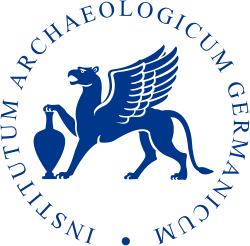Organization:German Archaeological Institute
 Logo of the German Archaeological Institute | |
| Founder(s) | Eduard Gerhard |
|---|---|
| Established | 1832 |
| President | Friederike Fless |
| Budget | €38 million[1] |
| Location | , |
| Coordinates | [ ⚑ ] : 52°27′38.10″N 13°18′1.27″E / 52.460583°N 13.3003528°E |
| Website | www.dainst.org |
The German Archaeological Institute (German: Deutsches Archäologisches Institut, DAI) is a research institute in the field of archaeology (and other related fields).[2] The DAI is a "federal agency" under the Federal Foreign Office of Germany.[3][4]
History
Eduard Gerhard founded the institute. Upon his departure from Rome in 1832, the headquarters of the Instituto di corrispondenza archeologica, as it was then named, was established in Berlin.[5] Its predecessor institute was founded there by Otto Magnus von Stackelberg, Theodor Panofka and August Kestner in 1829.
Hans-Joachim Gehrke was president of the institute from March 2008 to April 2011,[6] and has been succeeded by Friederike Fless.[7][8]
Facilities
The DAI currently has offices in cities including Madrid, Rome, Istanbul, Athens, Cairo, Damascus, Baghdad, Tehran and Sana'a.[9][10]
The DAI's Romano-Germanic Commission (Römisch-Germanische Kommission) includes the world's largest library for prehistoric archaeology and is located in Frankfurt. Its commission for the History of Classical Antiquity is in Munich and its Commission for the Archaeology of Non-European Cultures is located in Bonn.
Notable members
- Klaus Schmidt, German archaeologist and pre-historian who led the excavations at Göbekli Tepe from 1996 to 2014
- Eszter Bánffy, Hungarian prehistorian and archaeologist
- Yevhen Chernenko, Ukrainian archaeologist
- Elisabeth Ettlinger, Swiss archaeologist of the Roman provinces
- D. E. L. Haynes, English classical scholar, archaeologist and museum curator
- Nikolaos Kaltsas, Greek classical archaeologist
- Jürgen Oldenstein, German archaeologist of the Roman provinces
- Emmanouil Korres, Greek restoration architect and archaeologist[10]
- Paul Wittek, Austrian orientalist who formulated an influential theory of Ottoman origins
See also
- German Historical Institute
- German Archaeological Institute at Athens
- Projekt Dyabola
- Arachne (archaeological database)
References
- ↑ "Deutsches Archäologisches Institut". https://www.bundeshaushalt.de/#/2019/soll/ausgaben/einzelplan/05.html.
- ↑ Deutsches Archäologisches Institut retrieved 12:33GMT
- ↑ Deutsches Archäologisches Institut retrieved 12:26GMT 2.10.11
- ↑ Federal Foreign Office retrieved 12:47GMT 2.10.11
- ↑ Deutsches Archäologisches Institut retrieved 12:38GMT 2.10.11
- ↑ Timeline of Hans-Joachim Gehrke retrieved 16:08GMT 2.10.11
- ↑ Institut für Klassische Archäologie retrieved 16:26GMT 2.10.11 [|permanent dead link|dead link}}]
- ↑ "Prof. Dr. Friederike Fless". 27 September 2006. https://www.geschkult.fu-berlin.de/e/klassarch/institut/01_personen/honorarprofessoren/fless.html.
- ↑ "LOCATIONS Contact". https://www.dainst.org/en/dai/standorte/kontakte.
- ↑ 10.0 10.1 "direktoren". https://www.dainst.org/en/dai/geschichte/direktoren.
Bibliography
- Bittel, Kurt (1979), "Abteilung Istanbul", Beiträge zur Geschichte des Deutschen Archäologischen Instituts 1929 bis 1979, Mainz: Philipp von Zabern, pp. 65–91, ISBN 3-8053-0396-3, https://drive.google.com/uc?id=17F0nbaBNj9PqiiKvpuZGd1vok73OJwTj
